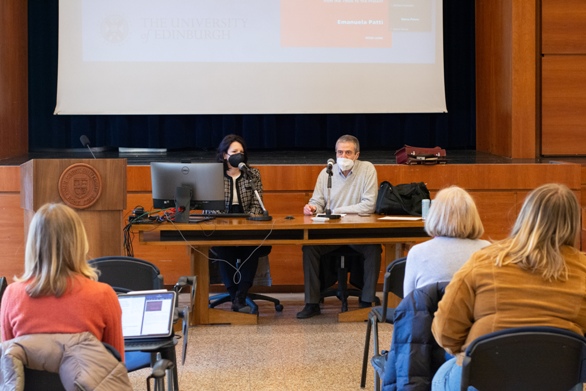Italian Electronic Literature: JCU Welcomes Author Emanuela Patti
On April 11, 2022, the JCU Modern Languages and Literature Department, in collaboration with the Communications Department, welcomed Italian author Emanuela Patti from the University of Edinburgh to talk about her new book, Opera aperta: Italian Electronic Literature from the 1960’s to the present (Peter Lang, 2022).

Emanuela Patti
Patti started the talk by saying she was very honored to present her book in Rome, which is a symbolic place for the birth of electronic literature. The inspiration for her book, which was first launched in Italy, came from the research she conducted to investigate the relationship between literature forms and electronic and digital media. The objective was to experiment across literary forms and electronic media, in the context of Italy, during the digital revolution, or the “Third Industrial Revolution,” which began in the latter half of the 20th century.
Electronic literature, according to Patti, refers to the works that take advantage of the capabilities and contexts provided by the stand-alone or networked computer. Patti posed the question, “why the birth of new hybrid genres?” She followed up by emphasizing that every time we have a technological change, we “provoke” a new genre inevitably. This idea refers to Rick Altman’s theory which states that new genres are born of the marriage between a pre-existing form and a new technology. Patti said that Altman’s theory was “exactly what happened” in the case studies she analyzed in her research.

Emanuela Patti (left) and JCU Professor Paolo Prato (right)
But Patti said that main genre categories have existed before there were computers, so what is the purpose of electronic literature? She said that it was obvious when she started her research that Italy did have modes of electronic literature. She recognized the relationship between humans, mass media, and computer technologies explaining that “electronic literature is not better, but it is something different.”
Patti outlined her research with a complex and sophisticated set of questions. One question asks, “How are these experiments in electronic literature used as a form of struggle, contestation, or resistance against late capitalism?” Patti said that this question also referred to information and digital capitalism in the technological sense. To try to answer this and other questions, she decided to go back to when Italian electronic literature started, since Italy is at the forefront of this genre, but has no history on it. Nanni Balestrini is who Patti calls “the founder of Italian electronic literature,” because in 1961 he produced ”Tape Mark I,” the first Italian electronic poem with the first computer, the IBM 7070.
The title of Patti’s book comes from Umberto Eco’s seminal work Opera Aperta (The Open Work) (Bompiani, 1962), published shortly after Balestrini’s poem was produced. According to Patti, Eco’s book and the concept of ‘opera aperta’ provides an effective methodological tool for exploring the ‘open textuality’ of electronic literature and how artists have come to terms with the new forms of expression offered by new media.
Patti gave a detailed explanation on how open work refers to the concept that “artists have the ability to transform reality and society” simply because, “they can act on all forms.” Open work is also an epistemological metaphor to reflect on how science and culture, as forms of knowledge, have informed the interpretation of signs, as well as the role of readers and audiences across centuries. Patti argued that this is especially relevant today in the age of social media where audiences have open interpretation to everything that we view online.





